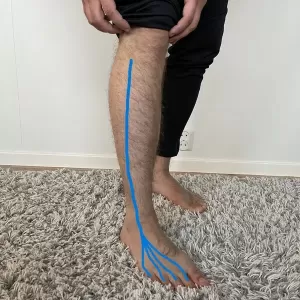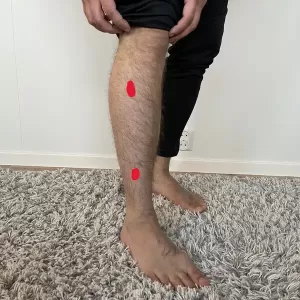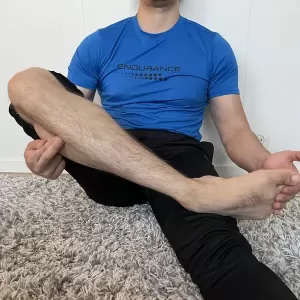How To Stretch Extensor Digitorum Longus
Extensor digitorum longus (EDL) is a muscle located in the front part of the lower leg. It origins from upper part of your tibia and fibula (shin bones) and goes down to the phalanges of 2. – 5. toe.
EDL’s main role is to extend 2. – 5. toe.
But, together with m. tibialis anterior, EDL participates in dorsiflexion in the ankle joint, which makes this muscle prone to tightness when m. tibialis anterior is weak and inhibited.
This article will show you the best stretching exercises for extensor digitorum longus, including how to test EDL for tightness and PNF technique and Myofascial techniques to help you relieve muscle tightness.
Let’s dive in.
How To Stretch Extensor Digitorum Longus
Let me show you some of the most efficient ways to stretch your EDL. You can perform all exercises without any equipment, from the comfort of your home.
1. Standing EDL Stretch
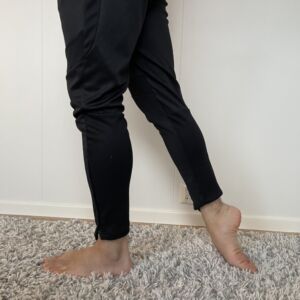
- Stand sideways facing the wall
- Spread the upper part of the foot on the floor
- Lean your body forward
- The ankle joint is in dorsal flexion while the toes are bent
- Hold for 30 seconds and repeat three times
2. Seated Active EDL Stretch
- Sit on a chair or the floor
- Keep the ankle joint in a neutral position
- Then, actively bend your ankle and toes down
- Repeat fifteen times
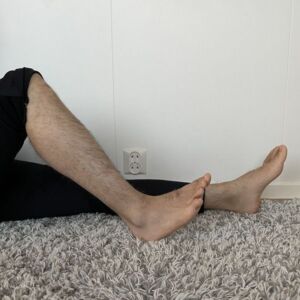
EDL active stretch starting position

EDL active stretch end position
3. Seated Passive EDL Stretch
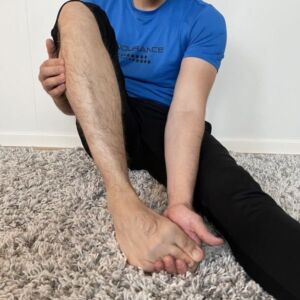
- Sit on a chair or the floor
- Keep the ankle joint in a neutral position
- With one hand, find the EDL muscle below the fibula
- With the other hand, stretch the ankle in the direction of plantar flexion and inversion while keeping the toes bent Holds for 30s
4. Sit on Your Heel Stretch
Sit on your heel gently and controlled. Hold for 30s. This exercise is simple to perform but can be challenging for those who have bad knees/ankle mobility.
Copy the position from the picture below.
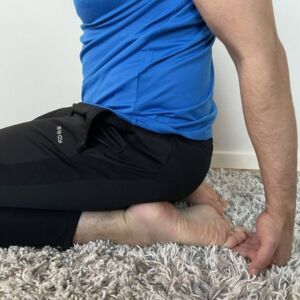
How to Tell if You Have Tight Extensor Digitorum Longus?
The easiest and most reliable way to tell if you have tight EDL is to perform the gentle passive stretch of EDL when seated.
Here is how you should do it:
- Sit down on the floor or a chair
- Bend your leg and palpate EDL muscle a few cm beneath head of the fibula
- Bend your 2. – 5. toe with your fingers
See the picture below.
The tightness test is positive if you have a reduced range of motion or tightness in EDL muscle during this test.

PNF Stretching Technique for Extensor Digitorum Longus
1. Seated Hold-Relax PNF Technique
Start with a static hold against the toe’s extension. Hold for 5-10s. See the picture below.
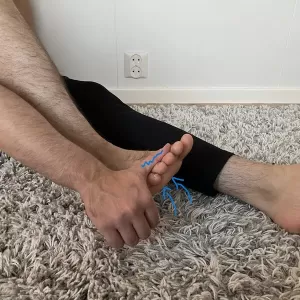
Then, continue with passive stretching of the toes. Hold for 30s. Repeat the whole process five times.
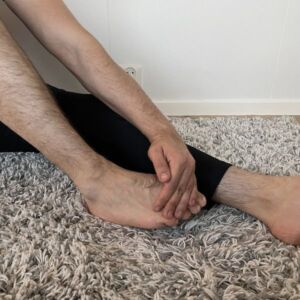
2. Sit on Heel Hold-Relax PNF Technique
Start by sitting on your heels. Push down with your toes, against your hand. Hold for 5-10s. See the picture below.
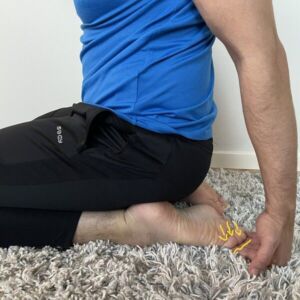
Then, pull your toes up with your hand so you achieve a nice and deep passive stretch of your EDL. Hold for 30s. Repeat the whole process five times.
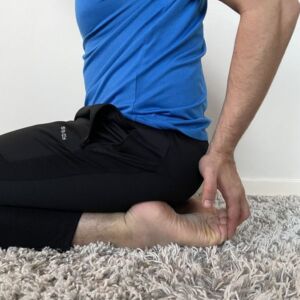
Myofascial Release Technique for Extensor Digitorum Longus
As mentioned before, EDL is prone to muscle tightness when m. tibialis anterior doesn’t perform its job as it should. When that happens, you can often experience muscle pain in EDL, as a result of overuse.
Here is the most common place for myofascial pain in EDL.
Now, let’s see how to combat myofascial pain.
- Place your finger on the painful spot.
- Hold the pressure while gently bending your toes with your hand.
- Hold for 60s.
- Repeat 3 times.
Continue improving your stretching routine with help of stretching exercise equipment for home use and/or best books about stretching.

